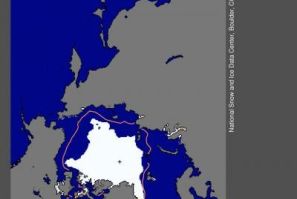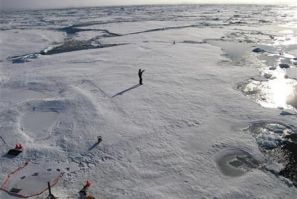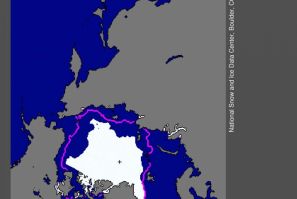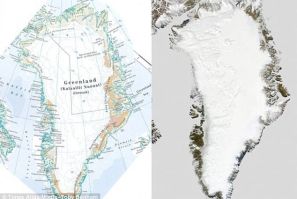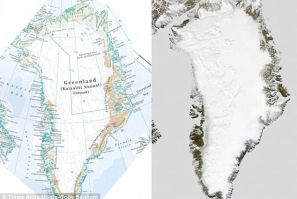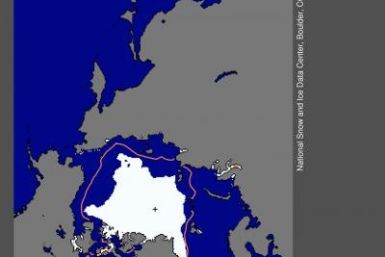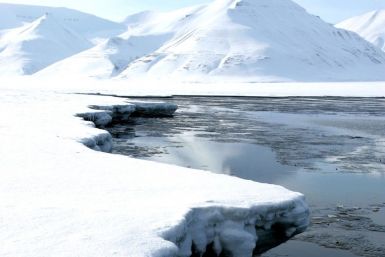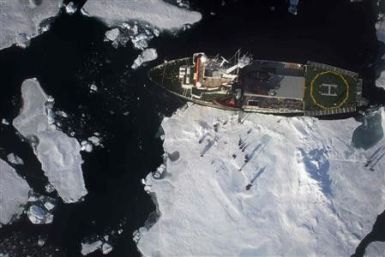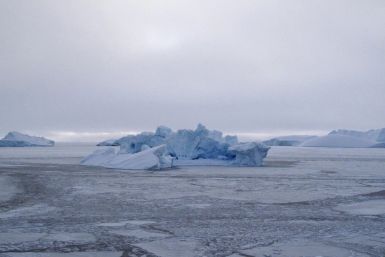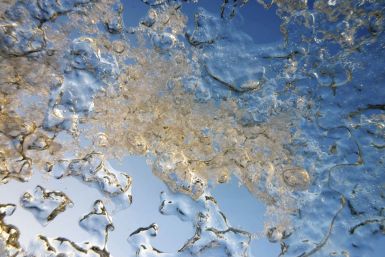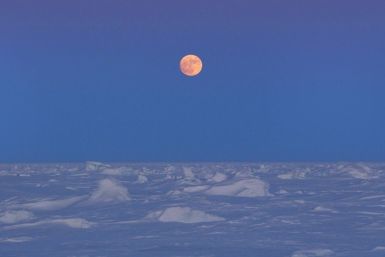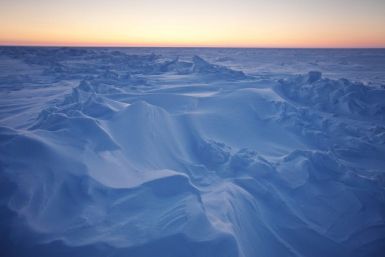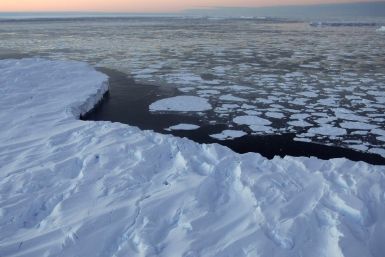Arctic ice reaches second lowest point in 50 years.
The Arctic sea ice extent fell to 1.67 million square miles, or 4.33 million square kilometers on Sept. 9. That minimum is more than one million square miles below the 1979 to 2000 monthly average extent for September, which experts say is an area larger than Texas and California combined.
Two separate reports recently confirmed ice covering the Arctic Ocean is melting at an alarmingly fast pace.
The Arctic sea ice extent in the last few days have decline slowly, the National Snow and Ice Data Center on Tuesday said that Arctic sea ice extent is currently at the second-lowest levels in the satellite record since 1979.
Arctic sea ice this summer melted to a record low extent or will come a close second, two different research institutes said on Tuesday, confirming a trend which could yield an ice-free summer within a decade.
The Arctic sea ice has reached a record historical low point on Sept. 8th, since satellite observations began in 1972.Global warming is melting the Arctic ice cap in a much higher speed than scientists had predicted, despite a rainy and cold summer.
Reports about an Arctic summertime sans ice due to global warming and natural swings in regional wind patterns are quite alarming. The extent of summer sea ice in the Arctic Ocean reached a record low this week since satellite observations began in 1972, according to the University of Bremen's Institute of Environmental Physics.
The North Pole's ice skull cap shrank to an historic low this week. Shrinking to its lowest point since satellite observations began in 1972, the area covered by the Arctic sea ice shrank to 4.24 million square kilometers (1.637 square miles) on Sept. 8, according to the University of Bremen's Institute of Environmental Physics.
As Arctic sea ice continues rapidly melting, a new study predicts it may completely disappear in future with huge consequence for regional ecosystems and the global climate.
Global temperatures soared have soared to new heights this summer, with July recording its seventh warmest temperatures since 1880 -- bringing Arctic sea ice levels to a record low in more than three decades.
New research indicates that Arctic sea ice may temporarily stabilize or expand over the next few decades after its rapid retreat that saw a historical peak in July. Arctic ice has been declining since the start of satellite monitoring in 1979, and half of the trend is attributed to human activity, the study also revealed.
New data has shown that Arctic sea ice levels plunged to a record low for the month of July in more than three decades of record-keeping.
Researchers from MIT criticized the United Nations' global climate report, saying it seriously underestimated the speed of Arctic sea ice loss.
Researchers from MIT attacked the United Nations' recent global climate report and said that the U.N. underestimated the severity of Arctic sea ice melting. MIT's research team said that the thinning is probably happened four times more quickly than the Intergovernmental Panel on Climate Change predicted.
Using computer modeling studies scientists at the National Center for Atmospheric Research, or NCAR, unexpectedly found that Arctic ice, under existing climate conditions, is as likely to expand as it is to contract for periods of up to about a decade. The study can be read in the Geophysical Research Letters.
Scientists are predicting that the Arctic sea ice may actually expand in the next decade.
Despite rising global average temperatures, we might see a short retrieve in the rapid decrease in Arctic sea ice in the coming decade. But the unexpected phenomenon will ultimately disappear after the estimated period of time.
Scientists at the National Center for Atmospheric Research, or NCAR, use computer modeling to reinforce previous research findings that the level of Arctic sea ice loss experienced in recent decades can't be explained by natural causes alone. Additionally, the ice will sooner or later disappear during summer if climate change continues, the scientists found.
Arctic sea ice may be fated to melt away with the continuous warming of the climate, but it could temporarily stabilize - maybe even expand ? over the next few decades, scientists in Boulder, Colo. say. Computer modeling studies done by scientists at the National Center for Atmospheric Research, or NCAR, has reinforced previous findings that the level of Arctic sea ice loss seen in recent decades can't be explained only by natural causes, and that the ice will sooner or later disappear durin...
Soaring temperatures in July left the amount of Arctic ice at its lowest level on record, continuing a trend of diminishing ice masses that reflects a steady increase in the planet's temperature.
Scientists on Thursday said that satellite images of Arctic sea ice show that it is melting at a near-record pace.
New studies show ice in Greenland and the Arctic is melting even faster than first anticipated, raising sea levels as much as 1.6 meters (five feet) by the end of the century.



